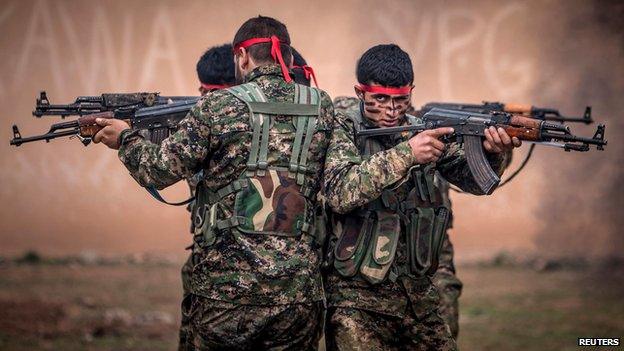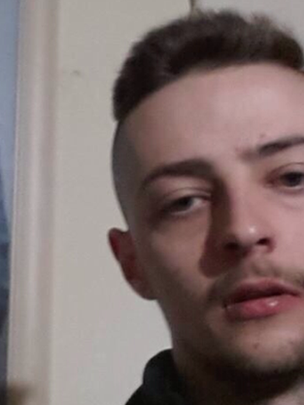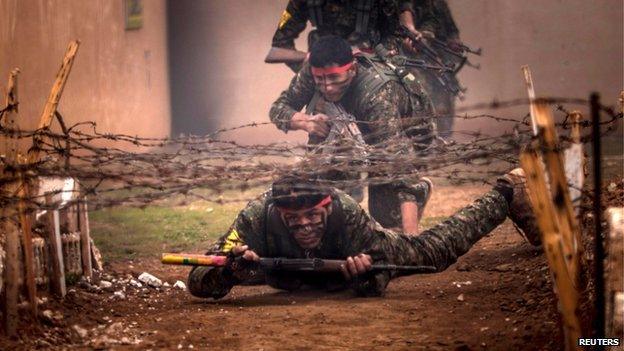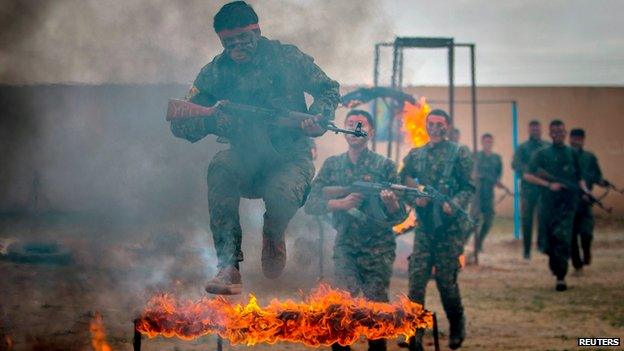An English IT worker trained to fight in Syria
- Published

Jac Holmes is currently at a Syrian training camp similar to this one, in Ras al-Ain
He has no military experience and no roots in the region. So what is a former IT worker from Dorset doing at a training camp in Syria, hoping to fight against Islamic State extremists?
Foreign fighters have become an intrinsic part of the conflicts in Syria and Iraq, with Islamic State (IS) and other jihadist groups attracting thousands to their ranks.
But a much-less-publicised phenomenon relates to the foreigners who travel abroad to fight against IS.
Many have ethnic links with Kurds in the region, and many who have spoken to BBC World Service Radio's Newshour programme in the past months are military veterans from the US and Europe who want to put their experience to use.

Jac Holmes spoke to the BBC from a training camp
And then there's Jac Holmes.
The 22-year-old from Bournemouth was drawn to Syria to join the People's Protection Unit, or YPG, the main Kurdish fighting force in northern Syria.
What sets Mr Holmes apart is that he has no military background.
He spoke to Newshour from a YPG military training camp in Syria.
He revealed how he had left the UK in January to travel to Syria via Iraq, but got deported from Iraqi Kurdistan's Erbil Airport.
However, he succeeded when he tried again a week later, on 16 January, this time via Sulaymaniyah in southern Kurdistan.
His Kurdish contacts took him to a safe house in the city, where he stayed for a few days before travelling up to the Syrian border.
He crossed the Tigris river into Syria before arriving at a YPG military training camp where other foreign volunteers were receiving training.
'Not romanticised'
Mr Holmes said his interest in Syria began in 2011.
His attention gradually shifted to the struggle of the Kurds in the north as IS started to target them.
He started following Kurdish social media accounts, as well as those of Western volunteers fighting with Kurds.
Mark Campbell, a pro-Kurdish activist who has been in contact with Mr Holmes, said: "He was always open about what he was doing, even when he was stopped by the UK police at the airport."
He said he felt "paternal" towards Mr Holmes "and ironically, as a campaigner, tried to dissuade him from travelling to Rojava (Western Kurdistan)".

A YPG commander said volunteers had to be trained before they could fight on the front line
Mr Holmes established contacts with the YPG's foreign fighter group, Lions of Rojava, during a battle in the Syrian Kurdish town of Kobane last September.
YPG, with the help of air support from nations signed up to the anti-IS coalition, staved off an all-out assault started by IS.
Asked if he had a romanticised view of his role in the Syrian conflict, Mr Holmes stressed that he did not find what he was doing "exciting".
"Romanticised? I don't think anyone really has a romanticised view about what's going on over here," he said, adding that he sees it as "a necessity".
Mr Holmes said he had received little military training but expected to be sent out to the front line soon.

The YPG said people from all over the world had joined its ranks
The BBC asked the general commander of the YPG unit for foreign fighters, whose nom de guerre is Qahraman, if Mr Holmes could indeed be sent to battle against IS with so little training.
He categorically denied such a thing would happen.
"Some who joined us have years of military experience in Western armies (and) want to go to the front line immediately," he said.
"We even don't let them go to the battle before they are trained with our tactics, know our way and learn to operate in this part of the region."
YPG has effectively stopped IS capturing mainly Kurdish areas and also helped to save thousands of Yazidi Kurds across the border in Iraq.
Family support
Qahraman said that YPG had always been a multi-national and multi-religious force that fights not only for the Kurds but for all communities.
Asked what kind of checks they carried out before accepting foreign volunteers to their ranks, Qahraman said: "In the vetting process we try to understand their motivation.
"If people choose to join us, we respect their decision.
"But if they come here and change their mind after that, we also help them going back to their country."
The Foreign Office has said anyone fighting in Syria is likely to be arrested on their return to the UK.
They would face charges if they were deemed to have taken part in acts of terrorism.
Mr Holmes said he recognised he could be arrested but added: "You just have to hope that our justice system works in the correct way."
He also said his family was aware of his movements.
"Of course they don't want me to do anything that could potentially put my life in harm's way," he said.
"But apart from that, they support me in what I want to do."
He said he was aware of the possibility of capture by IS.
Asked if his decision to travel to Syria could be branded naive, Mr Holmes replied: "I believe what I've got myself into, I know what's going on here.
"I think that's all there is to say really."